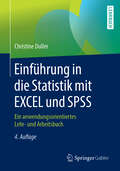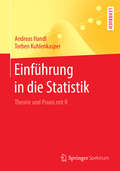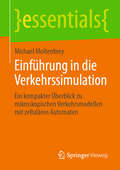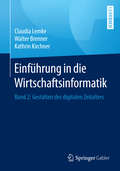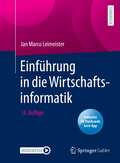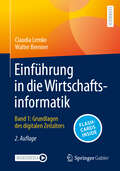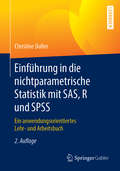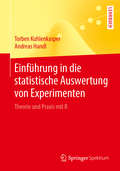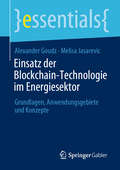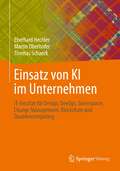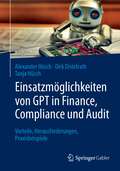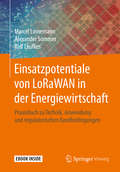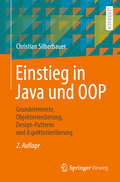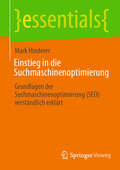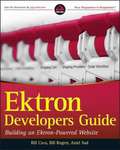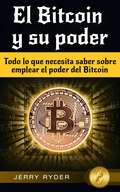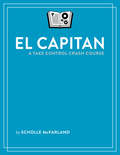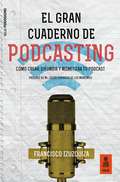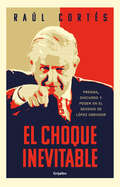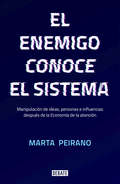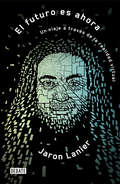- Table View
- List View
Einführung in die Statistik mit EXCEL und SPSS: Ein anwendungsorientiertes Lehr- und Arbeitsbuch
by Christine DullerDieses Lehrbuch führt leicht verständlich und anwendungsorientiert in die beschreibende und schließende Statistik sowie in die Wahrscheinlichkeitsrechnung ein:Die Methoden der Statistik werden nicht nur beschrieben, sondern auch in EXCEL und SPSS umgesetzt.Zahlreiche Beispiele mit Lösungen ergänzen die Darstellung, daher ist das Buch auch für das Selbststudium gut geeignet.Wesentliche Aspekte sind übersichtlich zusammengefasst, um das Lernen zu erleichtern und ein schnelles Nachschlagen zu ermöglichen.In der vierten Auflage wurden inhaltliche Ergänzungen (Boxplots und Fisher-Test) vorgenommen und die Software-bezogenen Inhalte an die jeweils aktuellen Versionen angepasst (IBM SPSS Statistics 25, Microsoft EXCEL 2019).
Einführung in die Statistik: Theorie und Praxis mit R
by Andreas Handl Torben KuhlenkasperDieses Lehrbuch motiviert und erklärt die Inhalte der deskriptiven und induktiven Statistik, indem es die mathematischen Grundlagen der Statistik mit vielfältigen, leicht nachvollziehbaren Anwendungen und Beispielen verbindet: Durch überschaubare Beispiele, die mit Papier und Stift durchgerechnet werden können (und sollten!) gewinnt der Leser zunächst Verständnis und einen routinierten Umgang mit den zentralen Formeln. Für größere Beispiele kommt das frei verfügbare statistische Software R zum Einsatz, welches die Berechnungen schnell und verlässlich auch für große Datensätze umsetzt.
Einführung in die Verkehrssimulation: Ein kompakter Überblick zu mikroskopischen Verkehrsmodellen mit zellulären Automaten (essentials)
by Michael MoltenbreyMobilität dominiert unser Leben. Der Straßenverkehr ist sowohl Keimzelle als auch Lebensader unserer modernen Gesellschaft. Doch wie kann man diesen fassen, planen und berechnen? Während der öffentliche Nahverkehr zumeist vorgegebenen Strukturen folgt – wie zum Beispiel ein Zug seinen Schienen – wirken die Bewegungen des Individualverkehrs chaotisch für den außenstehenden Beobachter. Dieses essential bringt Ordnung in das Chaos und setzt sich mit der mikroskopischen Verkehrssimulation auseinander. Michael Moltenbrey konzentriert sich auf die Vermittlung eines sehr einfachen und rudimentären Verkehrsmodells, welches die Bewegungen einzelner Fahrzeuge abbildet. Auf den ersten Blick sind die Bewegungen der einzelnen Verkehrsteilnehmer unvorhersehbar. Auf den zweiten erkennt man wiederkehrende Strukturen und Muster, die helfen, das Gesamtkonzept Verkehr besser zu erfassen.
Einführung in die Wirtschaftsinformatik
by Walter Brenner Claudia Lemke Kathrin KirchnerDieses Lehrbuch ist eine moderne und zukunftsweisende Einführung in die Wirtschaftsinformatik. Es kombiniert strategisches Wissen mit operativem Know-How. Als Leitfaden zur aktiven Gestaltung der komplexen Herausforderungen ist es die logische Fortsetzung des erfolgreichen ersten Bandes zum "Verstehen des digitalen Zeitalters".Die digitale Transformation ist die umfassendste Reformationsaufgabe von Wirtschaft und Gesellschaft und erfordert ein neues Set an Führungs- und Managementprinzipien. Daten und Algorithmen sind hierbei der universelle Rohstoff im digitalen Zeitalter. Das Buch liefert eine gut verständliche Einführung in die Programmierung und stellt ein Managementsystem zur Gestaltung der digitalen Transformation vor. Als Lehrbuch enthält es Lernziele und Kontrollfragen sowie Literaturempfehlungen zur weiterführenden Diskussionen. Dieser zweite Band eignet sich nicht nur für Studierende, sondern kann auch von Praktikern genutzt werden.
Einführung in die Wirtschaftsinformatik
by Jan Marco LeimeisterDas Buch gibt eine fundierte und praxisbezogene Einführung in das Gesamtgebiet der Wirtschaftsinformatik. Aufbauend auf den bewährten Vorgängerauflagen von Stahlknecht und Hasenkamp wurde die 13. Auflage komplett überarbeitet, strukturell weiterentwickelt und aktualisiert. Die Schwerpunkte umfassen u.a. Datenmanagement, Big Data, Analytics und Systementwicklung, Digital Business, Digitale Transformation, IT-Management sowie IT-Anwendungssysteme. Zusatznutzen: Laden Sie die Springer Nature Flashcards-App kostenlos herunter und überprüfen Sie Ihr Wissen.
Einführung in die Wirtschaftsinformatik: Band 1: Grundlagen des digitalen Zeitalters
by Walter Brenner Claudia LemkeDie Informations- und Kommunikationstechnik ist heute ein allgegenwärtiger Teil unseres privaten und geschäftlichen Lebens geworden. Diese tiefgreifende Veränderung von Wirtschaft und Gesellschaft entspricht den Auswirkungen der vergangenen industriellen Revolution. Dieses Lehrbuch bricht bewusst mit den traditionellen Ausbildungskonzepten der Wirtschaftsinformatik und stellt die Menschenzentrierung in den Mittelpunkt der privaten und beruflichen Nutzung von Informations- und Kommunikationstechnik. Aus dem Blickwinkel von Digital Natives werden die Grundlagen des digitalen Zeitalters und die wesentlichen Wirkungsweisen der Informations- und Kommunikationstechnik erklärt und zentrale Herausforderungen thematisiert. Zahlreiche Fallbeispiele erläutern die Definitionen, Konzepte und Methoden. Lernziele, Kontrollfragen und Diskussionsaufgaben runden dieses Lehrbuch ab. Die 2. Auflage wurde aktualisiert und um neue technologische Entwicklungen sowie Aufgaben in der Flashcards-App ergänzt. In dem vorliegenden ersten Band geht es um das Verstehen des digitalen Zeitalters. Im folgenden aktualisierten Band 2 stehen die Grundlagen der Programmierung und Datenanalytik im Vordergrund und im neuen Band 3 das Design und Management des digitalen Zeitalters. Zusatznutzen: Laden Sie die Springer Nature Flashcards-App kostenlos herunter und überprüfen Sie Ihr Wissen.
Einführung in die nichtparametrische Statistik mit SAS, R und SPSS: Ein anwendungsorientiertes Lehr- und Arbeitsbuch
by Christine DullerChristine Duller gibt in diesem Buch eine leicht verständliche Einführung in die nichtparametrische Statistik. Dabei beschreibt sie nicht nur die statistischen Verfahren, sondern setzt diese auch in SAS und R um. Beide Programmiersprachen stellt die Autorin kurz vor, sodass keine Vorkenntnisse notwendig sind. Das Buch eignet sich besonders für Studierende der Wirtschafts- und Sozialwissenschaften und alle Interessierten, die (nur) über Grundkenntnisse der Statistik verfügen, aber auch als Nachschlagewerk für einfache statistische Analysen.
Einführung in die statistische Auswertung von Experimenten: Theorie und Praxis mit R
by Andreas Handl Torben KuhlenkasperDieses Lehrbuch stellt eine Vielzahl von Werkzeugen zur Analyse von Experimenten zur Verfügung: Es zeigt die Grundlagen der Auswertung faktorieller Versuchspläne mittels ein- oder mehrfaktorieller Varianzanalysen (ANOVA) sowie mittels gängiger nichtparametrischer Alternativen. Darüber hinaus werden auch Verfahren zur Überprüfung der Annahmen von Varianzanalysen vorgestellt.Die einzelnen Verfahren werden zunächst anhand übersichtlicher Beispiele und Datensätze motiviert, vorgestellt und mit Papier und Stift durchgerechnet. Für größere Beispiele kommt die frei verfügbare statistische Software R zum Einsatz, mit der die manuellen Berechnungen nachvollzogen und schließlich auch größere Datensätze ausgewertet werden können.
Einsatz der Blockchain-Technologie im Energiesektor: Grundlagen, Anwendungsgebiete und Konzepte (essentials)
by Alexander Goudz Melisa JasarevicDie Blockchain-Technologie erweist sich als eine neue, hochinteressante Technologie, die seit der Einführung des Bitcoins in zahlreichen Anwendungsfeldern diskutiert wird. Die zahlreichen Forschungsprojekte untermauern die hohen Erwartungen an diese Technologie. Das vorliegende Essential soll ein grundlegendes Verständnis über die Blockchain-Technologie vermitteln und insbesondere den Fokus auf die technologische Ausgestaltung und Konzeptentwicklung in ausgewählten Bereichen der Energiewirtschaft legen.
Einsatz von KI im Unternehmen: IT-Ansätze für Design, DevOps, Governance, Change Management, Blockchain und Quantencomputing
by Eberhard Hechler Martin Oberhofer Thomas SchaeckIhr Unternehmen hat sich für KI entschieden. Glückwunsch, was nun? Dieses praktische Buch bietet einen ganzheitlichen Plan für die Implementierung von KI aus der Perspektive der IT und des IT-Betriebs im Unternehmen. Sie erfahren etwas über die Fähigkeiten, das Potenzial, die Grenzen und die Herausforderungen von KI. In diesem Buch erfahren Sie, welche Rolle KI im Kontext etablierter Bereiche wie Design Thinking und DevOps, Governance und Change Management, Blockchain und Quantum Computing spielt, und diskutieren die Konvergenz von KI in diesen Schlüsselbereichen des Unternehmens.Deploying AI in the Enterprise bietet Anleitungen und Methoden zur effektiven Bereitstellung und Operationalisierung nachhaltiger KI-Lösungen. Sie lernen die Herausforderungen bei der Implementierung kennen, wie z. B. Probleme bei der KI-Operationalisierung und Hindernisse bei der Umsetzung von Erkenntnissen in umsetzbare Prognosen. Sie werden auch lernen, wie Sie die Schlüsselkomponenten der KI-Informationsarchitektur erkennen und welche Rolle sie für eine erfolgreiche und nachhaltige KI-Implementierung spielt. Und Sie werden verstehen, wie Sie KI effektiv einsetzen können, um die Nutzung von Kerninformationen in Master Data Management (MDM)-Lösungen zu verbessern.Was Sie lernen werdenVerstehen der wichtigsten KI-Konzepte, einschließlich maschinelles Lernen und Deep LearningBefolgen von Best Practices und Methoden zur erfolgreichen Bereitstellung und Operationalisierung von KI-LösungenErkennen der kritischen Komponenten der KI-Informationsarchitektur und der Bedeutung eines PlansIntegration von KI in bestehende Initiativen innerhalb einer OrganisationErkennen der aktuellen Grenzen von KI und wie sich dies auf Ihr Unternehmen auswirken könnteBewusstsein für wichtige und aktuelle KI-Forschung schaffenIhre Denkweise anpassen, um KI von einem ganzheitlichen Standpunkt aus zu betrachtenMachen Sie sich mit den Möglichkeiten von KI in verschiedenen Branchen vertraut.Für wen ist dieses Buch gedacht?IT-Profis, Datenwissenschaftler und Architekten, die sich mit den Herausforderungen bei der Implementierung und dem Betrieb von KI auseinandersetzen müssen und einen umfassenden Überblick darüber benötigen, wie sich KI auf andere geschäftskritische Bereiche auswirkt. Es ist keine Einführung, sondern richtet sich an Leser, die nach Beispielen für die Nutzung von Daten suchen, um daraus verwertbare Erkenntnisse und Vorhersagen abzuleiten, und die die aktuellen Risiken und Grenzen von KI verstehen und berücksichtigen müssen und wissen wollen, was dies in einem branchenrelevanten Kontext bedeutet.
Einsatzmöglichkeiten von GPT in Finance, Compliance und Audit: Vorteile, Herausforderungen, Praxisbeispiele
by Alexander Hüsch Dirk Distelrath Tanja HüschDieses Buch wurde von drei Experten geschrieben, die mit Unterstützung von GPT, einen umfassenden Einblick in Einsatzmöglichkeiten generativer AI, wie GPT, im Finanzbereich von Unternehmen geben. Es liefert Hintergründe, Vorteile sowie die Herausforderungen und Risiken bei der Implementierung. Es werden neben allgemeinen Anwendungsmöglichkeiten im Unternehmen ebenso spezifische Anwendungen dargestellt. Dabei wird konkret in den Bereichen Controlling, Business Intelligence, Accounting, Investor Relationship, Innenrevision und Kontrollsysteme, Risikomanagement, Wirtschaftsprüfung und Datenschutz eingegangen. Das Buch befasst sich abschließend mit der Strategie im Einsatz von GPT.
Einsatzpotentiale von LoRaWAN in der Energiewirtschaft: Praxisbuch zu Technik, Anwendung und regulatorischen Randbedingungen
by Marcel Linnemann Alexander Sommer Ralf LeufkesLoRAWAN stellte eine kostengünstige Technologie dar, mit der Prozesse innerhalb einer Stadt schnell und einfach vernetzt werden können. Für die Versorgungswirtschaft ergeben sich hieraus enorme potentiale und Geschäftsmodelle. Dieses Buch beschreibt die Technik, die Einsatzfelder, die Potentiale und die regulatorischen Anforderungen, die berücksichtigt werden müssen.
Einsichten eines Informatikers von geringem Verstande: Glossen aus dem Informatik Spektrum
by Reinhard WilhelmEs ist für Fachleute wie Laien immer wieder überraschend, wie die Errungenschaften der Informatik das Leben der Menschen verbessern können, manchmal sogar in Richtungen, welche die Menschen gar nicht unbedingt wünschen. Die aus der Zeitschrift Informatik Spektrum stammenden Glossen in diesem Buch beschreiben kurzweilig und mit viel Humor viele solcher Errungenschaften: Wie sie entstehen, weshalb sie vielleicht doch nicht so groß sind und was noch auf uns zukommt.Eine amüsante Lektüre für Informatiker und ihre gequälten Anwender.
Einstieg in Java und OOP: Grundelemente, Objektorientierung, Design-Patterns und Aspektorientierung (Examen. Press Ser.)
by Christian SilberbauerProgrammieren lernen ist nicht schwer, wenn es richtig erklärt wird. Das Buch bietet eine anschauliche Erläuterung der Grundkonzepte der Programmierung, insbesondere der objektorientierten Programmierung. Alle schwierigen Aspekte werden ausführlich anhand möglichst einfach gehaltener Beispiele erklärt. Vermittelt werden viele Ideen aus der Programmierung wie z. B. Variablen, Funktionen, Rekursion, Datenkapselung oder Vererbung. Empfehlenswert für alle, die die objektorientierte Programmierung von Grund auf lernen und richtig verstehen möchten.
Einstieg in das Influencer Marketing: Grundlagen, Strategien und Erfolgsfaktoren (essentials)
by Marco Nirschl Laurina SteinbergDas vorliegende essential erl#65533;utert die Prinzipien des Influencer Marketing und liefert eine praxisorientierte und komprimierte Einf#65533;hrung in das Thema. Es stellt wirkungsvolle Strategien vor und beantwortet Fragen der Praktiker: Wie kann ich entscheiden, ob sich diese Marketing-Form f#65533;r mein Produkt eignet? Wie w#65533;hle ich die richtigen Kan#65533;le und schlie#65533;lich auch die richtigen Influencer aus? Wie wirkt Influencer Marketing in meinem Marketing-Mix? Klassische Marketing-Kampagnen schaffen es immer weniger, die Wahrnehmungsschwelle der Konsumenten zu durchdringen und somit deren Aufmerksamkeit zu erlangen. Sie schenken der klassischen Werbung immer weniger Vertrauen und holen sich Informationen nach dem Pull-Prinzip. Diese Entwicklung bedient den Trend des Influencer Marketing. Die Autoren geben Anwendungsbeispiele und Entscheidungshilfen.
Einstieg in die Suchmaschinenoptimierung: Grundlagen der Suchmaschinenoptimierung (SEO) verständlich erklärt (essentials)
by Mark HindererBekommen Sie einen grundlegenden, aber umfassenden Überblick über die Arbeitsweise von Suchmaschinen und wie sie Inhalte von Websites auslesen und bewerten. Lernen Sie Möglichkeiten zur Optimierung der eigenen Website kennen und steigern Sie so die Besuchszahlen Ihrer Website. Wie optimiert man die eigene Website, um das Potenzial der Suchmaschinenoptimierung (SEO) auszuschöpfen und die Erwartungshaltung hinter der Suchanfrage so zu erfüllen, dass ein positives Nutzungserlebnis geschaffen wird? Welche Faktoren einer Website können zu einem Rankingverlust führen und sollten vermieden werden, um nicht dem Wettbewerb die bessere Position in den Suchergebnissen zu überlassen?
Ektron Developer's Guide
by Bill Rogers Bill Cava Aniel SudThe first book to cover the Ektron content management system (CMS) Ektron CMS400. NET provides a complete platform that features all the functionality needed to create, deploy, and manage your Web site. The power is in your hands when you use the built-in server controls to deploy a site or customize the deployment with the API. Authored by a trio of Ektron insiders, this book escorts you through the detailed steps of building a prototype company site. Upon completion, you will have a complete and functional coded Web site that you can use as a template for future projects. Introduces the Ektron CMS400. NET as well as the Ektron architecture and includes an in-depth explanation of the Ektron framework Assumes no prior knowledge of the Ektron platform Shows you how to install the CMS, software dependencies, and samples sites Explains how to implement a social network and construct a storefront Ektron Users Guide provides you with everything you need to know about the exciting possibilities of working with this popular and powerful platform.
El Bitcoin y su poder: Todo lo que necesita saber sobre emplear el poder del Bitcoin
by Jerry RyderEl Bitcoin se está apoderando del mundo. Esta moneda digital es completamente diferente a todo lo que haya visto en el pasado, lo que la hace novedosa y excitante. También tiene varios beneficios, como ser: La capacidad de poder enviar dinero a cualquier parte del mundo con bajas tasas por transacción Mantener su información personal segura y protegida No tener que lidiar con la intervención del gobierno Ahora es el momento de empezar con el Bitcoin, el juego de la criptomoneda. Todos saben que el conocimiento es poder. En este libro aprenderá sobre: Que es el Bitcoin realmente Todos los modos en que puede usar el Bitcoin para beneficio personal Cómo comenzar La tecnología atrás del Bitcoin Lo que la moneda digital puede hacer por usted Pros y contras de utilizar monedas digitales Mejores estrategias de inversión Cómo hacer dinero con el Bitcoin Y ¡mucho más! ¡No espere más! Haga click en el botón de comprar ahora y obtenga “Bitcoin y su poder” hoy mismo, y ¡comience a obtener dinero!
El Capitan: A Take Control Crash Course
by Scholle McfarlandAscend El Capitan with Mac expert Scholle McFarland!In this crash course about OS X 10.11 El Capitan, former Macworld editor Scholle McFarland helps you discover and master changes in the Finder as well as in Apple's Notes, Safari, and Messages apps. The book's browsable layout makes it easy for you to find the information that you care about the most as you learn how to set up notifications sensibly, do more (or less) with your Dock, invoke Mission Control and set up a Split View, take phone calls on your Mac, locate all manner of things with Spotlight search, work fluidly between Apple devices with Handoff and AirDrop, dictate to your Mac -- and even tell it what to do -- plus lots more.Scholle closes with two under-the-hood topics, setting up a user account (for a child, guest, or troubleshooting) and essential troubleshooting techniques.Whether you want to browse for a few tips or go deep, you'll learn about...Four techniques for invoking Mission Control, with its new Spaces BarThe new Split View, which puts two apps side-by-side in an elegant wayHow pinned tabs in Safari work differently -- and in some cases better -- than bookmarksThe keyboard shortcut for auto-filling your personal information into a Safari formFinding the new checkbox for auto-hiding the menu barHow you can delete a file without emptying the entire Trash (finally!)What to do if you can't stand OS X's translucent menu bars and windowsHow to keep your Spotlight searches privateThe necessary settings for Handoff to work between devicesSetting up the Mac's Notification Center so it's usefulUsing the Attachment Browser in El Capitan's new Notes appDeciding whether to use plain or enhanced dictationMaking your Mac announce incoming alert notifications with a custom voiceSetting up smart folders that bring tagged files into view easilyEssential tips for decreasing Finder window overload with tabsMany picky details about AirDrop file transfer -- and ideas for alternativesSetting up an account for a child with parental controls and age-based limitsWhat to do if your Mac won't turn on, if you get the spinning beachball of death, or if you need to repair your disk -- and how to easily find out if your Mac still has AppleCareAs part of our Crash Course series, this book will provide the first-rate content you expect from us in short chunks so you can dip in and read quickly. Because so many Take Control readers give tech support to others, each concise chapter has sharing buttons and practical tweet-tips, making it easy to share a few pages with Facebook friends, Twitter followers, and others who really need the information. Crash Courses have a modern, magazine-like layout in PDF while retaining a reflowable design in the EPUB and Mobipocket versions.
El Gran Cuaderno de Podcasting: Cómo crear, difundir y monetizar tu podcast
by Francisco IzuzquizaEl Gran Cuaderno de Podcasting muestra todo lo necesario para aprender a crear un podcast, publicarlo y darlo a conocer para convertirse en un podcaster profesional. Francisco Izuzquiza, locutor y consultor de radio y podcasts, describe las claves y las herramientas imprescindibles para iniciarnos en el mundo de los podcasts y los consejos y aspectos técnicos para usuarios más avanzados o, incluso, expertos. Desde la elección del tema del podcast, su planificación, los métodos de grabación o el micrófono más recomendable según nuestras necesidades y presupuesto, a los programas de grabación, el alojamiento del podcast, la medición de escuchas, los rankings, la música, los derechos de autor y la monetización. El auge de los podcasts supone un reto apasionante para todo aquel que quiere acercase a esta actividad desde el mundo de la radio o desde cualquier otro sector. En este libro el autor comparte su experiencia y todo lo aprendido hasta conseguir dedicarse al podcasting de forma profesional.
El choque inevitable: Prensa, discurso y poder en el sexenio de López Obrador
by Raúl Cortés¿Por qué López Obrador se ha obsesionado con los medios (sobre todo con los "conservadores"), a quienes considera sus más fieros contrincantes? ¿Por qué miente y desinforma con tanta confianza incluso cuando se le presentan evidencias que anulan sus afirmaciones? ¿Qué consecuencias políticas tiene su actitud retadora y desdeñosa hacia la verdad y los hechos? Sea como un recurso para polarizar al país en su beneficio o como una genuina estrategia de cambio, el presidente de México ha logrado convertir la relación entre el poder y los medios de comunicación en uno de los aspectos centrales de su gestión. Esto ha generado confrontación, pero también dependencia, y ha marcado el ritmo de la discusión pública en México desde que el presidente estableció las conferencias "mañaneras" como la principal vía de comunicación de su gobierno. Este libro registra y analiza esa interdependencia. Mitad crónica de los primeros cuatro años de gobierno de AMLO, centrada en los bulos que se han lanzado día tras día desde el púlpito del presidente, y mitad ensayo sobre el uso político de las fake news y el papel de la ética periodística en un mundo dominado por la desinformación y la infodemia, es uno de los textos que mejor documentan un fenómeno tan complejo como preocupante: las implicaciones políticas de la posverdad.
El enemigo conoce el sistema: Manipulación de ideas, personas e influencias después de la economía de la atención
by Marta PeiranoTodo lo que no quieres pero necesitas saber sobre el poder, la economía, la sociedad y las telecomunicaciones en la era de la información. La red no es libre, ni abierta ni democrática. Es un conjunto de servidores, conmutadores, satélites, antenas, routers y cables de fibra óptica controlados por un número cada vez más pequeño de empresas. Es un lenguaje y una burocracia de protocolos que hacen que las máquinas hablen, normas de circulación que conducen el tráfico, microdecisiones que definen su eficiencia. Si la consideramos un único proyecto llamado internet, podemos decir que es la infraestructura más grande jamás construida, y el sistema que define todos los aspectos de nuestra sociedad. Y sin embargo es secreta. Su tecnología está oculta, enterrada, sumergida o camuflada; sus algoritmos son opacos; sus microdecisiones son irrastreables. Los centros de datos que almacenan y procesan la información están ocultos y protegidos por armas, criptografía, propiedad intelectual y alambre de espino. La infraestructura crítica de nuestro tiempo está fuera de nuestra vista. No podemos comprender la lógica, la intención y el objetivo de lo que no vemos. Todas las conversaciones que tenemos sobre esa infraestructura son en realidad conversaciones sobre su interfaz, un conjunto de metáforas que se interpone entre nosotros y el sistema. Un lenguaje diseñado, no para facilitar nuestra comprensión de esa infraestructura, sino para ofuscarla. El enemigo conoce el sistema pero nosotros no. Este libro te ayudará a conocerlo, y a comprender por qué la herramienta más democratizadora de la historia se ha convertido en una máquina de vigilancia y manipulación de masas al servicio de regímenes autoritarios. Solo así podremos convertirla en lo que más falta nos hace: una herramienta para gestionar la crisis que se avecina de la manera más humana posible. No tenemos un segundo que perder.
El futuro es ahora: Un viaje a través de la realidad virtual
by Jaron LanierEl padre de la realidad virtual nos explica sus infinitas posibilidades a través de su experiencia con la tecnología. A través del fascinante recorrido de una vida dedicada a la tecnología, Jaron Lanier expone la capacidad de la realidad virtual para iluminar y amplificar la comprensión que tenemos de nuestra especie y ofrece a los lectores una nueva perspectiva sobre cómo el cerebro y el cuerpo humano se conectan al mundo. Al entender la realidad virtual como una aventura tanto científica como cultural, Lanier demuestra el componente humanístico que esta aporta a la tecnología. Si bien sus libros anteriores ofrecían una visión más crítica de las redes sociales y de otras manifestaciones de la tecnología, en El futuro es ahora el autor argumenta que la realidad virtual puede hacer que nuestra vida sea más rica y más completa. Una obra que no solo nos muestra qué significa ser humano en esta era de posibilidades tecnológicas sin precedentes, sino que también une la dimensión tecnológica con nuestra experiencia corporal. Reseñas:«Una historia maravillosa, profundamente humana y sumamente personal.»Dave Eggers «Es el padre de la realidad virtual y un genio de la tecnología punta.»Sunday Times «Una mente tan ilimitada como internet.»Evening Standard «Íntimo e idiosincrásico [...] peculiar y fascinante [...] La vívida imaginación de Lanier se convierte en un personaje más. Su visión es humanista e insiste en que el objetivo más importante del desarrollo de la realidad virtual debe ser la conexión humana.»The New York Times Book Review «Una lectura esencial, no solo para los conocedores de la realidad virtual, sino para cualquiera interesado en comprender cómo la sociedad ha llegado a convertirse en lo que es hoy en día y en qué podría convertirse en un futuro no tan lejano.»The Economist «Brillante e inspirador.»Publishers Weekly
El gran cambio: Cómo desarrollar un emprendimiento exitoso en la era digital. El caso kambista
by Franco Lanata ZeladaConoce la historia de Kambista, la primera casa de cambio digital en el Perú Esta es la historia de un emprendimiento disruptivo. El modo como un grupo de amigos ideó Kambista: la primera casa de cambio digital en el Perú. El relato fresco de Franco Lanata, acompañado de los útiles comentarios de Daniel Bonifaz —socio fundador de Kambista—, da cuenta del desarrollo de este proyecto innovador y exitoso que supo resolver una necesidad en el campo de las transacciones monetarias en el país: cómo cambiar dinero de manera justa, segura y transparente mediante la vía digital. Aquí se cuenta el origen de la empresa, los errores, los aciertos, los desafíos, la consolidación del plan, las campañas comunicativas y, lo que es más resaltante, el trabajo en equipo de unos jóvenes que no solo supieron echar a andar su sueño, sino aportar un beneficio a la economía de todos los peruanos. El gran cambio se propone compartir los aprendizajes obtenidos a partirde la hazaña de Kambista, con el fin de que esta experiencia sirva de ayuda a futuros emprendedores.
El internet: Diferentes maneras de convertirse en parte de la comunidad (¿Cómo...? #79)
by Owen JonesEspero encuentre información rentable, de utilidad y de ayuda. Las ideas de este libro electrónico sobre diversos aspectos de Internet, incluido su uso en beneficio propio, están organizadas en 17 capítulos de entre 500 y 600 palabras cada uno. Espero que sea de interés para quienes esperan ganar dinero en línea y para quienes desean atraer más tráfico a un negocio fuera de la red mediante el empleo de los recursos a menudo “gratuitos” que ofrece Internet. También será útil para los blogueros que solo quieren hacer amigos al rededor del mundo y chatear con ellos. Afortunadamente, muchos aspectos de Internet siguen siendo gratuitos, especialmente si no se deja manipular por los autoproclamados gurús de Internet, que están esperando para abalanzarse sobre los novatos desprevenidos. Como beneficio adicional, yo mismo le autorizo para usar el contenido en su propio sitio web o en sus propios blogs y boletines, aunque es mejor si primero los vuelve a escribir con sus propias palabras.
